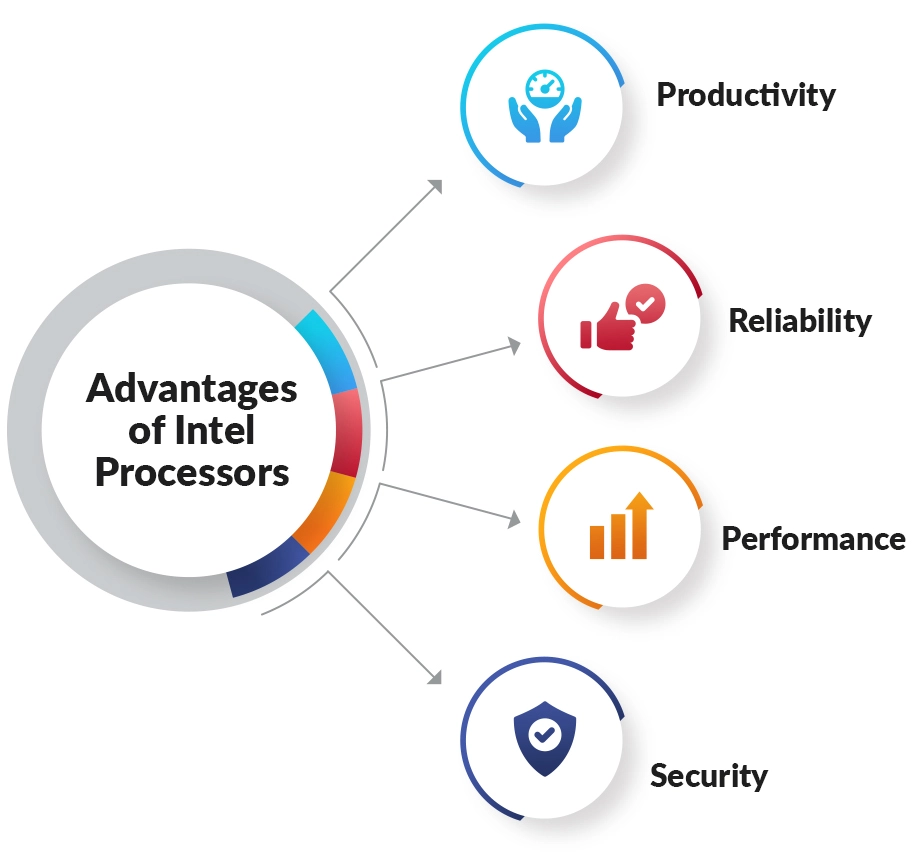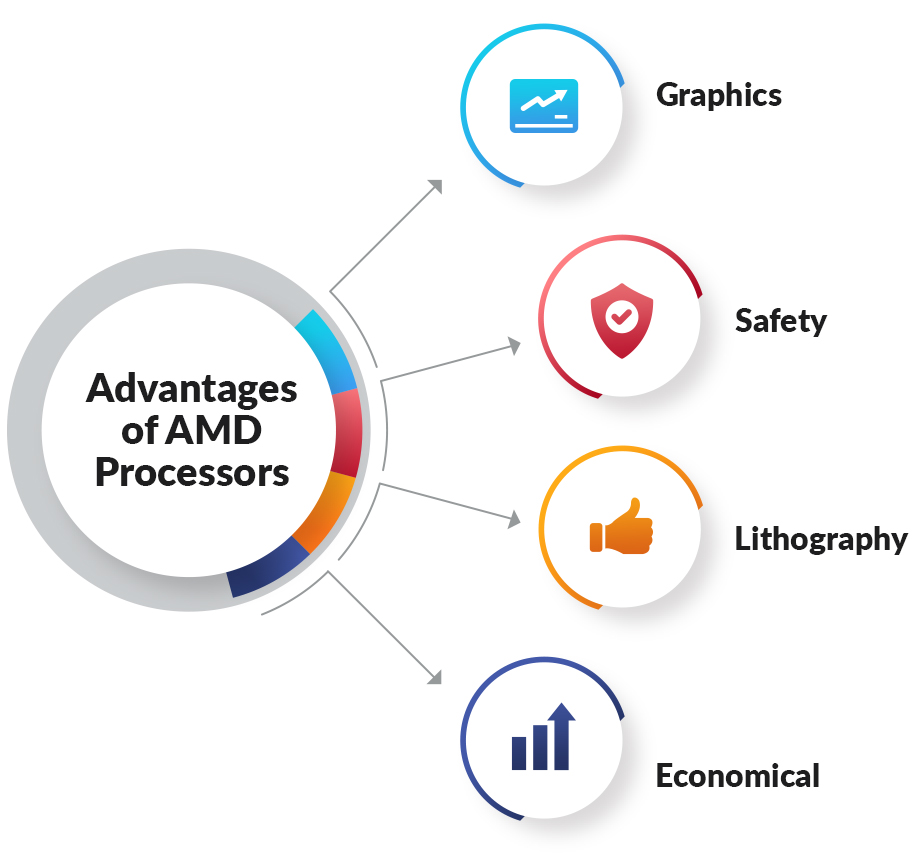
AMD vs Intel: Which CPU is Better?
Comparison Published on Date: February 18th 2022When it comes to upgrading or buying a new PC, choosing between AMD and Intel is where most of us get stuck. This blog covers the never-ending argument on AMD vs Intel to help you make an informed decision.
Table of Contents
- Introduction
- What is Intel?
- What is AMD?
- AMD vs Intel
- Intel vs. AMD CPU; Market Share and Prediction
- AMD vs Intel: Processor Comparison Chart
- AMD vs Intel: Which CPU is the best?
- AMD Ryzen 7 vs Intel Core i7: Performance
- Ryzen vs Intel – Strengths
- Ryzen vs Intel – Weakness
- Ryzen vs Intel – Pricing
- Which is better, Intel or Ryzen for programming?
- Conclusion
- Frequently Asked Questions
Intel and AMD are the world’s highest-valued semiconductor chip makers based on revenue. Both Intel and AMD are found in most processors of laptops and computers today. Hence, you might have observed these words written on your laptop.
While the suitability of these processors depends on the users’ needs and preferences, Intel and AMD are equally well-known and reliable brands. As these processors are not interchangeable, you need to understand the terms and their features in detail.
Why do you frequently hear the names “Intel” and “AMD”?
In the CPU world, the two major competitors are Intel and AMD. Although Intel has been a leader since the early 2000s, there has been a drastic change in the industry in the last few years. This doesn’t necessarily mean Intel has an upper hand compared to all other competitors. Other players might just be after a different target audience.
For a less technically inclined person, it might be difficult to choose between these two processors. Though this sounds intimidating, the purpose and target market of both of these processors is different. Thus, it is important that the buyer first understands his own budget and requirements, and then chooses the processor.
This article gives a comprehensive overview of what Intel and AMD really are, the difference between AMD and Intel, and which option will suit your needs better. Additionally, we’ve answered the most frequently asked questions by the users related to AMD Processor vs Intel.
Understanding Intel In-Depth – What Exactly Is Intel?
First things first, Intel is a 53-year old American multinational tech company. Intel supplies processors for computer system manufacturers like Apple, HP, Dell, and Lenovo. They also manufacture microprocessors, integrated circuits, and other devices that are related to computing and communication. In 1991, Intel became the biggest chip maker in the world and has held the position ever since, capturing a huge market share.
Here are the main advantages of using Intel processors:
- Productivity
- Reliability
- Performance
- Security
1. Productivity: They provide remarkable performance for great productivity and entertainment at the same time.
2. Reliability: They are reliable across a lot of different platforms and service requirements as well.
3. Performance: They support demanding applications with high performance.
4. Security: They are enhanced with high-security features.
Intel has a broad range of processors for laptops, desktops, workstations, and server management. They have processors to fit the buyer’s needs. These work well for personal and business uses including, gaming, content creation, IoT, and artificial intelligence. The most popular CPUs are the Intel Core processors that target mid-range customers.
Understanding AMD In-Depth – What Exactly Does AMD Stand For?
AMD stands for Advanced Micro Devices and is a Californian company. AMD supplies server processors, workstation processors, embedded and semi-custom processors, laptop processors, desktop processors, and Chromebook processors. Ryzen is the most popular brand for AMD processors. AMD is known to have the world’s highest-performing x8 processors.
Here are the main advantages of using AMD processors:
- Graphics
- Safety
- Lithography
- Economical
1. Graphics: AMD provides extraordinary graphics processors that are suitable for gaming specifically.
2. Safety: AMD can detect malware with its Enhanced Virus Protection feature.
3. Lithography: AMD has smaller lithography that does not cause the machine to heat up too often.
4. Economical: AMD targets groups of users that have lower budgets.
Offering a wide range of processors, AMD is a popular choice for buyers with a budget constraint, requiring high graphic quality and efficiency. It is also a reliable choice similar to its main competitor and is, therefore, preferred by users focusing on graphics and curbing expenses.
AMD vs Intel: 7 Major Differences Between Intel and AMD
Intel vs AMD has been a debate between content creators, PC gamers, and PC builders for a long time now. Intel and AMD are the top competitors in the CPU market – be it for workstations or for gaming. Comparing devices like laptops is difficult today since they are identical except for the CPU. Different factors like budget and specific requirements affect the choice that the buyer makes since the layout and infrastructure are completely different for both.
Here are some of the significant differences between Intel and AMD processors:
1. Processors
The AMD and Intel Processor debate is intense when it comes to the efficiency of processors. This depends on the kind of buyer buying these processors. While Intel processors are slightly more expensive than AMD processors. If a buyer is opting for a budget laptop, AMD processors might be a better choice. When it comes to power, AMD consumes more power than Intel processors. However, for a high-end laptop, an Intel-based processor might be a wiser choice since the compatibility is better and proves to be more advantageous.
2. Performance
AMD and the Intel CPUs offer performances that are very similar to the others. However, each of these specializes in specific things and also targets different sections of users. For example, AMD processors are known for better results in multi-tasking. This is one reason they are recommended for those who do not want to shell out too much money on laptops. Intel CPUs, on the other hand, are best for single-core tasks. They are faster but might be more expensive.
However, AMD CPUs tend to offer better value for money. While comparing AMD vs Intel gaming, a low-end segment laptop with an AMD processor also might give good results. However, users believe that Intel offers better performance for a higher price, but an AMD is a more reasonable option for a processor. For audio-video production or sound editing, Intel-based machines prove to give better outcomes.
3. Price
AMD has successfully been able to provide cheaper alternatives to CPUs in the last few years. Comparing AMD’s Ryzen 3 with Intel’s Core i3 processor, the former ranges between $95 and $120, while the latter ranges between $97 and $160. The lower price offered by AMD is one of the reasons why everyday users have started shifting to AMD from Intel in the last few years.
4. Market Share
Although Intel is an older company than AMD, AMD has significantly changed the distribution of the market share in recent years. According to HardwareTimes, Intel was at 75.40% market share while AMD was at 24.60% market share in 2021. There was a change in these statistics when Apple changes its processors from Intel to Apple Silicon. However, the majority of the market share still remains with Intel today.
5. Security
Those who know the industry well have always been worried about the vulnerabilities of processors that might ultimately harm the users. However, there has been no clear conclusion to the Intel or AMD debate when it comes to security. Intel however has 242 publicly disclosed vulnerabilities while AMD only has 15. Thus, AMD has advantages over Intel as AMD is more secure than Intel since the gap of vulnerabilities is too huge.
6. Products
Intel’s product line comprises microprocessors and motherboards while the AMD’s product line includes microprocessors, servers, and motherboards. Even though both have a variety of products, their processors are best known.
7. Customer Support
Both Intel and AMD have dedicated web pages to support their customers. Comparatively, Intel has a stronger community presence online. They have a detailed blog and interactive customer support. Intel also offers its customers round-the-clock phone and chat support. AMD allows its users to check details of their products, for example, warranty. They also have a detailed page with frequently asked questions to help their users.
These are the set of differences that might help a user decide on the priority features and then go ahead with either one of the two. We recommend understanding your needs and then reading the above points to see which option fulfills most of your needs before settling a choice.
Intel vs. AMD CPU; Market Share and Prediction
As of the third quarter of 2024, Intel held approximately 62% of the x86 computer processor market, while AMD accounted for about 35.5%
( Source: Statista ) In desktop AMD CPU has achieved 28.7% market share in Q3 of 2024.
Looking ahead, industry analysts suggest that AMD will continue to gain market share in 2025, driven by its focus on multi-core performance and efficiency. Conversely, Intel is expected to leverage advancements in AI and 3D technologies to maintain its competitive edge.
Let’s check out AMD Vs Inte Market Growth Prediction for next four years
| Market Share | Intel | AMD |
| 2025 | 68.96% | 31.04% |
| 2026 | 66.92% | 33.08% |
| 2027 | 64.88% | 35.12% |
| 2028 | 62.84% | 37.16% |
Key Insights on the above chart
Intel’s Market Share
In 2025, Intell will hold a dominant 68.96% of the market. However, by 2028, Intel’s market share is estimated to decline to 62.84%, which is a decrease of around 6.12% over four years.
This suggests rising competition from AMD and possible other market factors like innovation, pricing, or efficiency.
AMD’s Market Share
AMD’s market share starts at 31.04% in 2025. But we can notice steady growth reaching 37.16% by 2028, a gain of approx. 6.12 %. This growth reflects AMD’s rising adoption due to its focus on multi-core performance, competitive pricing, and energy efficiency.
Consistent Trends
The market share shifting between both companies states a consistent annual change, with Intel Losing around 2% points yearly, while AMD gains the same. This trend states ADM’s steady increase as a potent competitor in the AMD vs CPU market.
AMD vs Intel: Processor Comparison Chart
| Features | Intel | AMD |
| Performance | Intel Processors are mostly regarded as the Market leaders. | AMD processors offer competitive performance. |
| Multitasking | Intel has a good rating for multitasking | AMD excels in multitasking |
| Overlocking | Intel processors have limited overclocking capabilities. | AMD processors support overlocking |
| Integrated Graphics | Intel process comes with Intel UHD graphics | AMD processor comes with Radeon Vega graphics |
| Futureproofing | Intel depends on established technologies with periodic revamps | AMD focuses on constant innovation for future proofing. |
| Gaming Performance | Intel processor comes with high gaming performance | AMD has made significant changes in the gaming performance. |
| Compatibility | Intel processor needs particular hardware configurations | AMD processors are compatible with a wide system range. |
AMD vs Intel: Which CPU is the best?
The AMD vs Intel CPU tug-of-war is mostly undecided due to the various CPU models and variants available for each manufacturer.
However, you can make the appropriate decision by focusing mainly on CPUs within your price range that provide the best performance for your use case. Utilizing factors like support, power efficiency, stability, and security, can also help you to prefer your choices.
AMD vs Intel for Gaming
Intel CPUs mostly provide good performance and value for games as compared to AMD processors. When analyzing and evaluating complex AI in a video game, you require higher instructions-per-clock (IPC) and single-thread clock speed, this is the factors where intel shines. AMD chips’ core architecture is mostly more suitable for multitasking workloads compared to high-performance gaming.
When you think of gaming, usually what may come to mind are GPUs or Graphics Processing units and increasing GPU performance.
Moreover, gaming is actually among the most CPU-taxing activities. Some games can easily stress your CPU and raise its temperature very easily. Also, a good way to observe if your computer can manage and handle gaming at a high load for an increased time is with a CPU stress test.
Intel Models for Gaming
Intel Core i9-13900KS: Provides unparalleled gaming performance with exceptional clock speeds.
Intel Core i5-13600K: A value-packed choice for gamers seeking excellent performance.
Top AMD Models for Gaming
AMD Ryzen 7 7800X3D: Equipped with 3D V-Cache, delivering top-tier gaming performance.
AMD Ryzen 5 7600X: A budget-friendly option for high-frame-rate gaming
CPUs for Content Creation
If you want to perform mid-level tasks like image or video editing, threat count is of vital importance, as you want to make sure that your CPU can manage and organize multiple processes at once.
While intel is generally observed and recommended best in the mid-level performance. Let’s check out some top models for content creation.
Top Intel Models for Content Creation
Intel Core i9-13900K: Excellent multi-threaded performance, ideal for 3D rendering and heavy video editing.
Intel Core i7-13700K: A balanced option with strong single and multi-core performance.
Top AMD Models for Content Creation
AMD Ryzen 9 7950X: Exceptional multi-core performance, perfect for demanding workflows.
AMD Ryzen 7 7800X3D: Great for creators who need speed and efficiency on a budget.
CPUs for office or Homework
Sometimes, you don’t require your PC to game or edit images and movies, and you just require a fast computer to do your work, browse seamlessly, or Shop online.
You may not require the upgraded or updated largest processor, you just need to do the work. Let’s check out some top Intel vs AMD models for home or office work.
Top Intel Core Models for Office or Homework
Intel Core i5-13600K: Excellent for multitasking and productivity software.
Intel Core i3-13100F: Affordable and ideal for basic office tasks and student use.
Top AMD Models for Office or Homework
AMD Ryzen 5 5600G: Combines great performance with integrated graphics, ideal for light tasks.
AMD Ryzen 3 5300G: Budget-friendly and suitable for daily productivity needs.
CPUs for Laptops
Laptops are the most flexible in today’s fast-moving world. You can work and access it from anywhere.
Top CPUs for Laptops
Intel Core i7-13700H: High performance for professional tasks and light gaming.
Intel Core i5-12500H: A mid-range option ideal for general use and occasional multitasking.
Top AMD Laptop CPUs
AMD Ryzen 9 7945HX: Outstanding performance for creative professionals and gamers.
AMD Ryzen 5 7640HS: A power-efficient choice for everyday use and casual gaming.
AMD Ryzen 7 vs Intel Core i7: Performance
Both Ryzen 7 and Core i7 processors are high-end CPUs designed for demanding tasks like gaming, content creation, and multitasking.
Single-core performance: It refers to the capability of how fast a CPU can complete a task with a single core. Intel CPUs are excellent in Single-core performance. Tasks like gaming, etc. Heavily depends upon single-core performance.
Ryzen processors offer good single-core performance. But not as reliable and strong as Intel processors.
Multi-core performance: In contrary to single-core performance, Multi-core performance focus on the tasks that require various cores to complete tasks.
Ryzen processors mainly offer multiple cores, making it sufficient for heavy tasks like 3D rendering, video editing, and other tasks requiring multiple cores. Whereas Intel processors offer fewer cores as compared to Ryzen at the same prices.
Gaming: Intel Core i7 processors generally offer a slight edge in gaming performance, particularly in games that heavily rely on single-core performance.
Moreover, AMD Ryzen 7 processors have significantly improved their gaming performance in recent generations, and it can often deliver comparable or even better frame rates in many titles contrary to Intel, especially for those streaming and content creation.
Content Creation: Ryzen processors, typically the Ryzen 9 and Threadripper series, often excel in content creation tasks like video editing and 3D rendering due to their typically higher core counts and superior multi-core performance.
Whereas Intel processors also provide these features but at a higher and premium price, for instance, Intel Xeon.
Multitasking: Both processors are capable of handling demanding multitasking workloads. However, Ryzen 7 processors, with their higher core counts and advanced simultaneous multithreading (SMT) technology, often provide a smoother multitasking experience.
AMD Ryzen 7 vs Intel i7 – Specification
Core Count and Threads: Ryzen 7 processors generally offer a higher core count and thread count as compared to the Intel Core i7.
This translates to better performance in multi-threaded applications. Whereas Inter Core i7 is based on single-core performance making it easy to speed up task completions.
Clock Speeds and Cache: Intel Core i7 processors typically have higher clock speeds, which can benefit single-threaded performance and gaming.
Whereas Ryzen 7 processors often have larger L3 cache, which can improve performance in certain workloads.
Architecture: Both manufacturers continually refine their architectures, with recent generations featuring advanced features like integrated graphics, improved power efficiency, and support for the latest technologies like PCIe 5.0 and DDR5 memory.
About architecture, Ryzen offers Zen, Zen+, Zen 2, and Zen 3 (latest) whereas Intel core offers various series like Skylake, Kaby Lake, and Comet Lake.
Integrated Graphics: Intel processors mostly have integrated graphics. It is useful for computers or laptops required for daily media consumption. It is beneficial for users who do not require any dedicated graphics.
Whereas Ryzen APUs (Accelerated Processing Units) have integrated graphics; making it beneficial for gaming, game building, and high media consumptions like 3D rendering and Video editing.
Overlocking support: Intel’s K-series processors are renowned for their overclocking potential. Intel’s platform often provides a more mature and refined overclocking experience, with features like advanced voltage and frequency adjustments.
AMD Ryzen processors, particularly the “X” series, offer strong overclocking potential, allowing for substantial performance gains with careful tuning.
Power efficiency: Intel CPUs are popular for their energy efficiency, generating less heat and consuming less power. This makes them an excellent choice for laptops and thin-and-light notebooks where battery life and thermal management are critical.
AMD Ryzen CPUs have made significant progress in power efficiency in recent generations. It becomes more comparable to Intel. Their higher core counts can sometimes lead to increased heat generation.
This may necessitate more robust cooling solutions to maintain optimal performance and prevent overheating.
Ryzen vs Intel – Strengths
Strengths of Ryzen
Exceptional Multi-core Performance: Ryzen CPUs, particularly are those with higher core counts. They consistently deliver outstanding performance in multi-threaded workloads.
This makes them ideal for demanding tasks like video editing, 3D rendering, and content creation, where multiple cores can work in parallel to accelerate processing.
Excellent Price-to-Performance Ratio: Ryzen processors offer a compelling value proposition, delivering high performance at competitive prices.
This makes them a strong choice for budget-conscious builders who prioritize performance over brand recognition.
Strong Gaming Performance: As Intel traditionally held an edge in gaming, Ryzen CPUs have significantly improved their gaming performance in recent generations. Many Ryzen processors can now deliver competitive frame rates in popular games, making them a viable option for gamers.
Advanced Features: Ryzen processors incorporate a range of advanced features, including high core counts, large L3 caches, and support for the latest technologies like PCIe 5.0 and DDR5 memory. These features contribute to overall system performance.
Strengths of Intel
Dominance in Gaming (Generally): Intel Core i7 and i9 processors often maintain a slight edge in gaming performance, particularly in demanding titles that heavily rely on single-core performance and high clock speeds.
Mature Ecosystem: Intel boasts a long and established history in the CPU market. This translates to a mature ecosystem with a wide range of compatible motherboards, coolers, and other components.
Strong Single-Core Performance: Intel processors generally excel in single-threaded workloads, which can benefit certain applications and gaming scenarios.
Advanced Manufacturing Processes: Intel continues to improve its manufacturing processes that lead to improved performance, power efficiency, and higher clock speeds in its latest generation processors
Ryzen vs Intel – Weakness
Weaknesses of Ryzen
Can sometimes lag in gaming performance: While Ryzen 7 processors have significantly improved in gaming, Intel Core i7 processors often retain a slight edge, particularly in demanding titles that heavily rely on single-core performance.
Historically, some games may have been less optimized for AMD architectures: This has improved significantly in recent years, but older or less-optimized games might occasionally exhibit slightly lower performance on Ryzen compared to Intel.
Can generate more heat: Higher core counts in Ryzen processors can lead to higher heat generation, which may require more robust cooling solutions to maintain optimal performance and prevent thermal throttling.
Weaknesses of Intel
Can be more expensive: Intel Core i7 processors often command a higher price as compared to similar Ryzen 7 processors.
The single-core performance advantage is diminishing: While Intel traditionally held a significant lead in single-core performance, the gap between Intel and Ryzen has narrowed considerably in recent generations.
Historically, some power consumption concerns: While Intel has made strides in power efficiency, their processors can sometimes consume more power compared to Ryzen, especially in high-core-count models. This can lead to higher heat generation and potentially increased energy costs.
Ryzen vs Intel – Pricing
| Processor | Price (in Rs.) | Price (in $) |
| AMD Ryzen 7 – 5800X | Rs. 32000 | $ 390.24 |
| Intel core i7 – 12700K | Rs. 41000 | $ 500.00 |
AMD Ryzen 7 vs Intel i7 – overall comparison table
| Feature | AMD Ryzen 7 | Intel Core i7 |
| Architecture | Zen 4 (latest) | Raptor Lake (latest) |
| Core Count
|
Typically, 8 | Typically, 8-16 (hybrid architecture) |
| Thread Count | Typically, 16 | Typically, 16-24 (hybrid architecture) |
| Clock Speed | Varies by model, generally high | Varies by model, generally high |
| Cache | Large L3 cache | Large L3 cache |
| Gaming Performance | Excellent, often competitive with Intel | Generally, leads especially in demanding titles |
| Content Creation | Excellent, often superior due to higher core/thread counts | Strong, but may lag behind Ryzen in heavily multi-threaded tasks |
| Multitasking | Excellent, handles demanding workloads smoothly | Very good, benefits from hybrid architecture |
| Power Consumption | Generally, more power-efficient | Can be higher, especially with high core counts |
| Price | Generally, more affordable | Can be more expensive
|
| Use cases | Content creation, gaming, streaming, multitasking | Content creation, gaming, high-end computing |
Why choose Ryzen processors?
Choose Ryzen because: –
Ryzen processors offer excellent performance at competitive prices.
Ryzen’s strong multi-core performance makes it ideal for demanding creative workloads.
Ryzen processors can handle multiple tasks simultaneously without a noticeable performance hit.
Why choose Intel processors?
Choose Intel because: –
Intel Core i7 processors often provide a slight edge in gaming performance.
Intel’s platform offers mature overclocking capabilities and a wide range of high-end components.
Intel processors typically excel in single-threaded workloads.
Which is better, Intel or Ryzen for programming?
For programming both Intel and Ryzen are excellent choices. Both have their own strengths and weaknesses. To choose the right processors, consider these few points:
Programming Workload: If your work involves heavy multi-threading (like compiling large projects or running multiple virtual machines), Ryzen might be a better choice.
Budget: Ryzen is generally less expensive than Intel.
Personal Preference: Some programmers may prefer the Intel ecosystem or its specific features.
Conclusion
Both Intel and AMD have been dictating the processor world today. Some AMD and Intel differences make each one of these special and more suitable for a certain group of users. However, the user has to determine the budget, requirements, and different activities. According to these factors, the user can then easily decide which is better in AMD or Intel.
This is an important choice that can decide the working style of a user for a few years, especially since these cannot be replaced or changed once used. While Intel has been leading with a majority of the market share since its inception, it has had continued support from its loyal customers. However, it is predicted by experts that AMD will steal a significant part of it and give Intel more intense competition in the coming years.
Frequently Asked Questions
Q 1. Which is more reliable – Intel or AMD?
Ans. According to experienced users and experts, there is not much difference between AMD and Intel when it comes to reliability. Even though the efficiency and products might be different, they are both equally reliable. This also explains why they are tough competitors in the market.
Q 2. Are Intel and AMD the same for laptops?
Ans. The choice of AMD vs Intel laptop depends on the user of the laptop completely. If the user is choosing a high-end laptop and expects faster and better performance at a higher rate, then Intel might be a good choice. If the user does not want to spend too much money on the laptop and its processor, AMD gives great value for money at affordable prices.
Q 3. Which processor is better for gaming?
Ans. When it comes to AMD or Intel for gaming, experts in the industry tend to trust Intel more than AMD. Speed and graphics are two main components that users generally look for in a good gaming processor. Intel beats AMD when it comes to speed, but AMD offers better integrated graphics performance.
Q 4. Are there similarities between Intel and AMD?
Ans. Although there are some similarities between Intel and AMD, people usually tend to compare them and understand the differences more closely. One of the biggest similarities between the two is that AMD and Intel both use the x86 ISA to design their chips.
Q 5. What is Ryzen?
Ans. Ryzen is the most popular brand of microprocessors designed by AMD. AMD launched its first-generation Ryzen in 2019 and has a range of both CPUs and APUs. There are different versions of Ryzen – Ryzen, Ryzen Pro, and Ryzen Mobile. Ryzen has a smaller transistor, fewer shared resources, and an improved intra-processor link.
Q 6. Is Ryzen better than Intel for everyday use?
Ans. Ryzen by AMD is more affordable and thus makes a better choice for everyday use. It has excellent graphics, which is a feature most regular users look out for. When it comes to Intel, it is better for high-intensity activities like video editing and gaming.
Q 7. Why is AMD cheaper than Intel?
Ans. In the pricing difference between AMD and Intel, AMD is significantly cheaper than Intel when it comes to microprocessors chips and CPUs. Experts say that Intel is more expensive because of its brand name. However, there are also talks about both AMD and Intel specializing in different features and targeting different groups of users.
Q 8. AMD vs Intel – Which is more durable?
Ans. CPUs in general are considered to be the most durable part of a device. Some professionals believe that Intel and AMD are equally durable. However, AMD users generally see more issues because they tend to use the processor more and at a faster speed than usual. Intel on the other hand limits this kind of overclocking. This is a reason most people also believe that Intel is more durable than AMD.
Q 9. What is Intel Core?
Ans. Intel Core is a line of core chips designed by Intel Corp. There are different series and versions of Intel Core that target different features. While Intel Core is the brand name, there are different brand modifiers like i3, i5, i7 attached to it. It is followed by the gen indicator and product line suffix. These give information about the different cores, SKUs, product lines, etc.
Q 10. Is AMD faster than Intel?
Ans. No, Intel is faster than AMD. Intel is said to be much faster than AMD, but only after a specific point. If a user only considers everyday activities, then both AMD and Intel offer the same speed. However, if a user uses AMD CPUs more than they should, there can be a case of overclocking.
Q 11. Can an Intel CPU be replaced with AMD in a laptop?
Ans. No, a user cannot replace an Intel CPU with an AMD CPU. Both AMD and Intel use different kinds of sockets, which makes it impossible for a user to replace one with the other. The chips of both AMD and Intel are different and thus, cannot be used with the other’s motherboard.
Q 11. Are AMD laptops good for gaming?
Ans. Yes, AMD laptops are excellent for gaming. With processors like the Ryzen 7 7845HX or Ryzen 9 7945HX, AMD laptops can handle AAA games smoothly. The addition of Radeon GPUs in some models also enhances performance for gamers
Q 12. Which is better, Intel or Ryzen laptop?
Ans. Intel Laptops: Better single-core performance, making them ideal for gaming, high-speed tasks, and software-reliant on single-threaded performance.
Ryzen Laptops: Superior multi-core performance, energy efficiency, and price-to-performance value, making them great for gaming, multitasking, and long battery life
Q 13. Which CPU is best for gaming?
Ans. It depends on your budget and needs:
High-End:
Intel Core i9-13900KS – unmatched performance for competitive gaming.
AMD Ryzen 7 7800X3D – excels with 3D V-Cache for AAA games.
Mid-Range:
Intel Core i5-13600K – great balance of cost and gaming performance.
AMD Ryzen 5 7600X – affordable with solid performance for modern games.
Q 13. Which is better for gaming laptop Intel or AMD?
Ans. Both Intel and AMD offer excellent CPUs for gaming laptops, but the choice depends on specific needs:
Intel Gaming Laptops: Known for their strong single-core performance and high clock speeds, Intel CPUs like the Core i7-13700H or Core i9-13900HX are ideal for gaming laptops. They often pair well with high-refresh-rate displays and powerful GPUs.
AMD Gaming Laptops: AMD excels with efficiency and multi-threaded performance, especially with models like the Ryzen 9 7945HX. AMD laptops are often more budget-friendly and deliver great gaming performance with better battery life.
Q 14. Which CPU is better for video editing – Ryzen or Intel?
Ans. Ryzen 7 processors often excel in video editing due to their typically higher core counts and superior multi-core performance.
Q 15. Which CPU is better for 3D rendering – Ryzen or Intel?
Ans. Ryzen processors mainly offer multiple cores, making it sufficient for heavy tasks like 3D rendering
Q 16. What is the difference between cores and threads?
Ans. Cores are the physical processing units within a CPU. Threads allow a single core to handle two or more instruction streams simultaneously, improving performance in multi-threaded applications.
Q 17. Can I upgrade my motherboard to support a newer generation of CPU?
Ans. Yes, both Ryzen and Intel offer long-term platform support, allowing users to upgrade their CPUs without having to replace their entire motherboard. However, compatibility depends on the specific motherboard and CPU.




